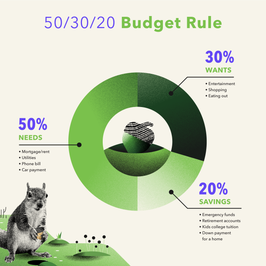3 Tips to Avoid Living Paycheck to Paycheck

It may be a moment of great opportunity for those seeking work, but many of those currently working are still struggling. Half of working Americans say they’re living paycheck to paycheck, according to a January MagnifyMoney survey. That includes 76% of those making less than $35,000 per year, and 31% of those making $100,000 or more.
When a person lives paycheck to paycheck, expenses consume most of their salary, leaving little to no spare cash for saving or investing. That can mean they have trouble covering costs if something disrupts that regular income, like job loss or an emergency expense.
“Unfortunately, it’s quite common,” says Anthony Santoro, a wealth management advisor at Arista Wealth Advisors in Albany, New York. “The average American tends to spend more than they make.”
Luckily, there are ways to help break the cycle.
Assess and adjust your budget
Santoro suggests starting by getting a detailed look at your spending, including big bills and smaller purchases. “A lot of the major credit card [issuers] out there, they’ll actually give you a pie chart of where your spending was allocated,” he says.
Then see how those expenses compare with a budget framework like the 50-30-20 rule, which recommends that you earmark 50% of your income for essential expenses, 20% for savings and investments, and 30% for discretionary expenses.
“Starting out, it might take a little sacrifice,” says Travis Tracy, a certified financial planner at Fortitude Financial Planning in Durham, North Carolina.
But by determining where your money is going, you can figure out what kind of changes you need to make to help get ahead.
Pay yourself first
Building up your emergency savings is key to breaking the paycheck-to-paycheck cycle: When you have a cash cushion, you have more of a buffer against any disruptions to your pay.
Santoro recommends setting up automatic contributions so that part of your paycheck automatically goes into a savings account. “If you know there’s no money in there at the end of the month, you’re not going to spend it,” he says.
Earn Extra Income via Side Hustles
If your essential bills are high, looking for ways to earn more money may be more fruitful than making cuts to your expenses.
There are side hustles for every type of skill ― including proofreading, dog walking, renting out your stuff, and more. Sometimes all it takes to get started is a phone, an internet connection, and 30 minutes of your time here and there.
“If you can put in a couple hours and do the hard work,” says Santoro, “the opportunity is there if you want to take it.”
This material has been presented for informational and educational purposes only. The views expressed in the articles above are generalized and may not be appropriate for all investors. The information contained in this article should not be construed as, and may not be used in connection with, an offer to sell, or a solicitation of an offer to buy or hold, an interest in any security or investment product. There is no guarantee that past performance will recur or result in a positive outcome. Carefully consider your financial situation, including investment objective, time horizon, risk tolerance, and fees prior to making any investment decisions. No level of diversification or asset allocation can ensure profits or guarantee against losses. Article contributors are not affiliated with Acorns Advisers, LLC. and do not provide investment advice to Acorns’ clients. Acorns is not engaged in rendering tax, legal or accounting advice. Please consult a qualified professional for this type of service.








